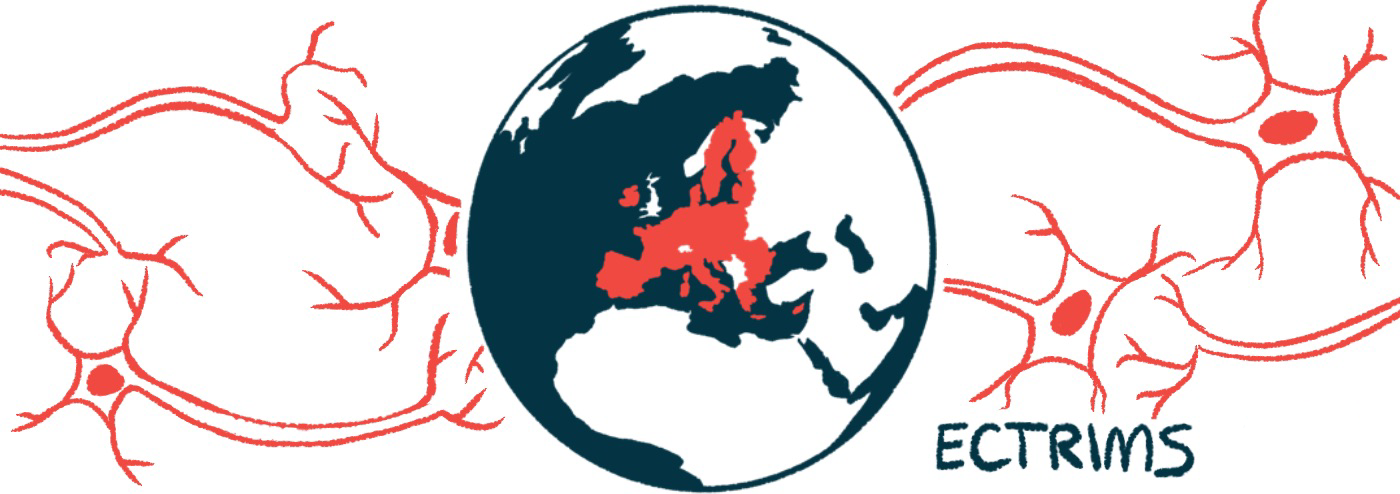#ECTRIMS2022 – Tecfidera Lowers Risk of 1st Symptoms in RIS in Trial
Phase 4 trial is 1st to show DMT benefit in radiologically isolated syndrome

Treatment with Tecfidera (dimethyl fumarate) significantly reduces the risk of experiencing the first multiple sclerosis (MS) symptoms in adults with radiologically isolated syndrome (RIS), according to data from a Phase 4 clinical trial.
RIS is a condition in which patients have MS-like lesions on MRI scans, but lack typical symptoms of the disease.
This is the first clinical trial demonstrating the benefit of disease-modifying therapies (DMTs) in people with RIS — the “earliest detectable pre-clinical phase of multiple sclerosis,” Darin Okuda, MD, the trial’s principal investigator, said in an oral presentation at the 38th Congress of the European Committee for Treatment and Research in Multiple Sclerosis (ECTRIMS).
Okuda is a professor of neurology and the director of the MS and Neuroimmunology Imaging Program, as well as director of the Neuroinnovation Program, at University of Texas Southwestern Medical Center, in Dallas.
The trial’s results, “Multi-center, randomized, double-blinded assessment of dimethyl fumarate in extending the time to a first clinical demyelinating event in radiologically isolated syndrome (ARISE),” were shared by Okuda at the ECTRIMS 2022 Congress, held Oct. 26–28, both virtually and in Amsterdam, Netherlands. Biogen, which developed and markets Tecfidera as a DMT, funded the trial.
Investigating Tecfidera for RIS
Initially described by Okuda and his team in 2009, RIS is diagnosed when brain or spinal cord MRI scans — requested for reasons other than suspected MS — reveal lesions similar to those seen in MS patients, even in the absence of any symptoms.
The extent to which people with RIS are likely to develop MS — and the potential factors linked to a higher risk of its progression — remains unclear. Also, “the impact of a given disease-modifying therapy in preventing the clinical onset of MS in a group of RIS [patients] is unknown,” Okuda said.
Biogen launched the ARISE Phase 4 clinical trial (NCT02739542) in 2016 to assess whether Tecfidera was superior to a placebo at reducing the risk of developing symptoms related to a loss of myelin in RIS patients. Myelin is the protective coating around nerve fibers that helps in conducting electrical signals.
A total of 87 adults — 61 women and 26 men — diagnosed with RIS were enrolled at a dozen MS centers in the U.S from March 2016 to October 2019. Patients had been diagnosed due to the presence of MS-like lesions on MRI scans done in 2009 or after, but an absence of MS symptoms.
Participants, who were in their mid-40s, were randomly assigned to receive either the approved dose of Tecfidera (240 mg; 44 patients) or a placebo (43 patients), twice daily for 96 weeks, or nearly two years.
A higher proportion of patients in the Tecfidera group had gadolinium (Gd)-enhancing lesions, which indicate areas of active inflammation. The reasons for MRI indication were similar between the groups, and primarily were headache and trauma.
The trial’s main goal was to determine the time to the first clinical symptoms of MS. Secondary goals included changes in brain and total lesion volume, the number of new or enlarging lesions, and the number of Gd-enhancing lesions.
Results showed that Tecfidera treatment significantly reduced the risk of a first clinical demyelinating event by 82%, compared with a placebo. This effect was even greater after adjusting for potential influencing factors such as age at diagnosis, sex, MS family history, disability level, and lesions at the study’s start,.
Tecfidera was linked to a 93% lower risk.
In a pre-specified analysis of the first 40 patients enrolled for each group — the number deemed necessary for drawing robust conclusions on Tecfidera’s effects — the therapy was associated with a significant reduction in the number of new or enlarging lesions compared with a placebo (reflecting an 80% lower risk). The analysis was adjusted for the number of Gd-enhancing lesions at this study’s start.
“This finding is very consistent with our pre-specified primary [goal] analysis of our data,” Okuda said.
‘Significant’ benefits shown for patients
Tecfidera-treated patients also showed a significantly lower number of new or enlarging lesions than those in the placebo group, as well as a smaller increase in lesion volume.
This second measure failed to reach statistical significance, but Okuda noted that patients on a placebo who experienced a first event of MS symptoms could chose to switch to no treatment, Tecfidera, or Plegridy (peginterferon beta-1a), and they would still undergo MRI at the end of the study. This means that the differences between groups on MRI-based measures are likely underestimated.
“Within our study, we only observed acute clinical events,” Okuda said, referring to the common relapses observed in people with relapsing forms of MS. Continuously progressing symptoms that “evolved to a primary progressive clinical course were not observed.”
The therapy was generally well-tolerated, “with no unexpected safety outcomes throughout the trial,” Okuda said. Study discontinuation rates were comparable between groups.
A greater proportion of patients on Tecfidera experienced moderate adverse events compared with those on the placebo group (32% vs. 21%). Similar rates of severe adverse events were reported between groups (5% for Tecfidera vs. 9% for placebo).
“This is the first clinical trial that really demonstrated the benefit of a given disease modifying therapy in preventing a first acute clinical event in people with RIS,” Okuda said.
Tecfidera treatment “resulted in over 80% risk reduction relative to placebo, [and] we did not see anything remarkable with respect to adverse reactions,” he said.
According to Okuda, the data highlight the potential of DMT in RIS.
These findings “support the benefit of early treatment intervention within this MS disease spectrum,” Okuda said.
“In the future we would actually like to see further studies be performed to assess the impact in disability outcome measures following treatment for a meaningful amount of time,” he said.
Note: The Multiple Sclerosis News Today team is providing in-depth coverage of the ECTRIMS Forum 2022 Oct. 26-28. Go here to see the latest stories from the conference.








